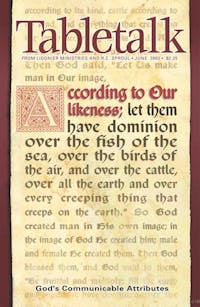
Request your free, three-month trial to Tabletalk magazine. You’ll receive the print issue monthly and gain immediate digital access to decades of archives. This trial is risk-free. No credit card required.
Try Tabletalk NowAlready receive Tabletalk magazine every month?
Verify your email address to gain unlimited access.
In 1983, the famous Russian author Aleksandr Solzhenitsyn delivered the Templeton Address in London. In his speech, he stated: “More than half a century ago, while I was still a child, I recall hearing a number of older people offer the following explanation for the great disasters that had befallen Russia: Men have forgotten God; that’s why all this has happened … And if I were called upon to identify briefly the principal trait of the entire twentieth century, here too, I would be unable to find anything more precise and pithy than to repeat once again: Men have forgotten God.”
Solzhenitsyn’s analysis of the fundamental trait of the twentieth century is accurate. Atheism of both a theoretical and a practical kind has run rampant.
Yet, it is not only in the world that men have forgotten God. Many in the church have forgotten Him, as well. Paul’s words to the Athenians could easily be applied to many within the walls of the church: “Whom therefore ye ignorantly worship, Him declare I unto you” (Acts 17:23, KJV).
Many professing believers today are completely ignorant of the true nature of the One whom they worship. There is no understanding of His holiness or righteousness. His omnipotence, omniscience, and immutability are regularly denied or distorted by professing Christians. The doctrine of the Trinity is often misunderstood. In fact, the only attribute of God that regularly receives any sustained attention is His love, and yet even that attribute is explained in a way that contradicts the teaching of Scripture.
How can this situation begin to be changed? In the first place, the true Biblical doctrine of God must be proclaimed from every Christian pulpit. Our attention must be turned away regularly from ourselves and toward the One whom we worship. Our focus must be God, not man.
For those who wish to begin digging deeply into what Scripture teaches about God, there is no better place to go than to Stephen Charnock’s The Existence and Attributes of God, published by Baker Books. At 1,150 pages, this book is not for the faint-hearted. It involves a major commitment of time and effort. But then, most things that are worthwhile do.
The book is divided into 14 discourses. In each discourse, Charnock takes one topic and exhaustively examines what the Bible tells us about it. He begins with two very helpful discourses on the existence of God and practical atheism. He takes as his starting point Psalm 14:1: “The fool has said in his heart, ‘There is no God.’” He examines what it means to deny the existence of God and explains that many who profess belief in God with their mouths deny belief in God with their actions. As Paul explains, “They profess to know God, but in works they deny Him” (Titus 1:16). Charnock elaborates: “Evil works are a dust stirred up by an atheistical breath. He that habituates himself in some sordid lust, can scarcely be said seriously and firmly to believe that there is a God.…”
The old cliché, “Actions speak louder than words,” is certainly applicable here. The essence of practical atheism is to live “as if’ God does not exist.
In the remaining discourses, Charnock discusses at great length various attributes of God: His spiritual nature, eternity, immutability, omnipresence, knowledge, wisdom, power, holiness, goodness, dominion, and patience.
One of the most edifying sections of each discourse is that in which Charnock explains the practical relevance of truly knowing and understanding a particular attribute of God. In dealing with God’s eternality, for example, Charnock explains how an understanding of this attribute helps us to overcome our fear of death. He writes: “It is impossible that the believer, who is united to the immortal God that is from everlasting to everlasting can ever perish; for being in conjunction with him who is an ever-flowing fountain of life, he cannot suffer him to remain in the jaws of death.”
In addressing the much-maligned doctrine of immutability, Charnock explains how it is a profound comfort to God’s people: “What comfort could it be to pray to a God, that like the chameleon changed colors every day, every moment? What encouragement could there be to lift up our eyes to one that were of one mind this day and of another mind tomorrow?”
Too many Christians think of the attributes of God as obscure, impractical doctrines. To the contrary, as Charnock observes, there are no more practical doctrines in Scripture than those that reveal to us the nature of God.
Charnock has written a book that is a spiritual gold mine. It will drive you to Scripture and to your knees in adoration of the living God who has revealed Himself in His holy Word. Men today have forgotten God. Allow the great Puritan Stephen Charnock to remind you again of who He is.
